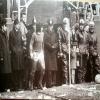| Swansea City: a model club’s descent into bitterness on 08:53 - Feb 11 with 4756 views | WarwickHunt |
What the hell has happened to Swansea City? It feels like a pertinent question after the events of the past ten days in south Wales. A club who a few years ago were held up as an example of co-operative, supporter-led ownership and intelligent leadership have become riven with bitterness, mistrust and resentment and, on Saturday, supporter protests.
“No ambition, no investment, sold out,” one banner read and Swansea’s transfer deadline day, which swiftly took on the appearance of a desperate fire sale of the club’s most valuable assets, will certainly go down as one of the more perplexing in recent memory. It was followed, 48 hours later, by the resignation of Huw Jenkins, the club’s chairman of 17 years.
The result of last season’s relegation was always going to be chastening for Swansea who, according to Chris Pearlman, the chief operating officer writing in the match-day programme, had their annual income drop by £60 million. That is a daunting sum for a club the size of Swansea to cope with and so the departures of Jefferson Montero, Tom Carroll and Wilfried Bony on loan to West Bromwich Albion, Aston Villa and Al-Arabi respectively took the number of exits to slash the club’s post-Premier League wage bill to 19 across two transfer windows.
Only six players have arrived in the opposite direction, and none of them joined last month. That in itself was asking a lot of Graham Potter, the manager, but when Leroy Fer, the club captain, appeared to be on the verge of joining Carroll at Villa, and Daniel James, an exciting 21-year-old winger, came perilously close to joining Leeds United for £8.5 million, only for the plug to be pulled in the final hour, it felt to many as though the club’s American owners, Jason Levien and Steve Kaplan, were cutting much farther and deeper than the squad could be expected to bear. “There’s just a complete breakdown of trust really,” Steven Carroll, editor of the Swansea Oh Swansea fanzine, says.
Potter is the former Östersunds manager who masterminded the Swedish minnows’ rise from the country’s fourth tier to top flight, as well as last season’s Europa League adventures. He replaced Carlos Carvalhal at the Liberty Stadium in the summer and led Swansea to a hard-fought but deserved 1-0 win against Millwall on Saturday. The 43-year-old deserves great credit for keeping Swansea, 11th in the Sky Bet Championship, within six points and touching distance of the play-offs in the straightened and increasingly strained environment that he has inherited in his first job in England.
Jenkins’s parting gift, it appears, was to veto the deals for Fer and James. And, while his part in Swansea’s remarkable ascent from the foot of the Football League to the top flight between 2005 and 2011 was a topic of discussion around the Liberty, so too was his part in the club’s decline over the past three years. In 2002 Jenkins, along with a group of long-standing supporters, raised £1 million to save the stricken club and the supporters’ trust raised £200,000 for a 21 per cent stake and an elected member on the club’s board.
In the next decade Swansea left the decrepit Vetch Field for the £27 million Liberty Stadium, funded by Swansea council, and with a sense of unity and ambition and the adroit appointments of Kenny Jackett, Roberto MartÃnez and Brendan Rodgers as managers they moved into the Premier League.
Michael Laudrup and Gary Monk led the club to League Cup success in 2013 and an eighth-place Premier League finish two years later. More recently, though, the hiring and firing of Francesco Guidolin, Bob Bradley, Paul Clement and Carvahal in the space of two years, and some calamitous dealings in the transfer market, led Swansea to surrender their top-flight status meekly in May.
“We were the model club, I suppose. For any club that isn’t the biggest, to get themselves into the top flight, to gradually build every year. We had a philosophy, ‘The Swansea Way’, but we’ve lost our way,” Steven Carroll says.
However, it is the effects of the decision of Jenkins and his fellow investors to exclude the trust from negotiations to sell a majority stake in the club, in 2016, to Levien, the managing general partner of the Major League Soccer side DC United, and Kaplan, principal of Oaktree Capital investment fund, and vice-chairman of the Memphis Grizzlies basketball franchise, and their US-based consortium that may have the most lasting impact on Swansea.
“Everything we worked for – as a group of people, not just the trust, all shareholders aligned, trying to do the best for the football club – one decision to sell the club behind the trust’s back took that ownership model and destroyed it overnight,” Phil Sumbler, the supporters’ trust chairman, says. “I think we probably became just another Premier League football club, struggling to survive on a season-by-season basis.”
The trust is in a period of arbitration with the club concerning the sale. Members may soon be balloted to determine whether or not legal action, for what they believe to have been unfair prejudice as 21 per cent stakeholders, is the necessary course of action. “The Americans bought roughly two-thirds of the football club,” Sumbler says. “They should have been buying two-thirds of everybody’s shares on a pro-rata basis. That would have put something in the region of £12 to £15 million in the trust’s coffers, sitting there, ready, for a rainy day, of which we have had too many over the years.”
Jenkins and his fellow investors, meanwhile, made millions – as much as 100 times their original investments. Many feel that Jenkins, who stayed on as chairman with a six-figure salary until last week, should have left some time ago, but he retained the support of Levien and Kaplan until last week, when some sharply worded statements suggested a breakdown in relations.
Frustratingly, there have been enough encouraging signs on the pitch to suggest that, with even modest investment to supplement a squad full of talented young players, Potter could be the man to bring back the slick, progressive, passing football with which Swansea were for so long synonymous, and spearhead a return to the Premier League which, after all, is the only way the owners will see a return on their investment.
James, the jewel in Swansea’s crown, was back to his effervescent best on Saturday after being left out for the defeat by Bristol City last weekend, two days after spending the evening at Leeds’ Thorp Arch training ground waiting for confirmation of a transfer that never came. He is not, however, the only young player to have risen to the task this season.
Matt Grimes, an elegant midfielder who spent last season on loan at Northampton Town in League One; Connor Roberts, an industrious Wales right back; Ollie McBurnie, a languid, old-fashioned centre forward with 13 league goals; Bersant Celina, the Kosovan No 10 who joined from Manchester City for £3 million in the summer; and Joe Rodon, a home-grown centre back, have all flourished under Potter’s tutelage. All are 23 or younger.
George Byers, a 22-year-old midfielder, settled the game with a first-half volley that deflected beyond Jordan Archer, the Millwall goalkeeper, and after the trip to face Leeds United at Elland Road on Wednesday night there is the visit of Brentford for a place in the FA Cup quarter-final to look forward to next Sunday. Still, a cloud lingers over the Liberty.
“Trying to turn the environment into a more positive one was always the challenge,” Potter says. “We’re going through a process . . . I’ve always seen my role as working with the players, to help them, to carry on building a team that connects with supporters. That’s the most important thing at a football club.”
Perhaps Swansea’s owners would do well to remember that. |  | |  |
| Swansea City: a model club’s descent into bitterness on 09:07 - Feb 11 with 4703 views | Headmaster |
Thanks Warwick. |  | |  |
| Swansea City: a model club’s descent into bitterness on 09:36 - Feb 11 with 4579 views | costalotta |
| Swansea City: a model club’s descent into bitterness on 09:07 - Feb 11 by Headmaster |
Thanks Warwick. |
Concur |  | |  |
| Swansea City: a model club’s descent into bitterness on 09:36 - Feb 11 with 4578 views | Pegojack |
Well done Warwick.
How refreshing at last to see the sellouts' despicable action laid bare in one of the country's main newspapers for all to see. How many times in the past couple of years have media accounts of our club frustratingly ignored their backstabbing move as if it was irrelevant?
It's what has brought us to where we are now, and there can be no fresh start, no wiping the slate clean, until the Supporters Trust gets justice from these scumbags. |  | |  |
| Swansea City: a model club’s descent into bitterness on 09:39 - Feb 11 with 4563 views | Private_Partz |
| Swansea City: a model club’s descent into bitterness on 08:53 - Feb 11 by WarwickHunt |
What the hell has happened to Swansea City? It feels like a pertinent question after the events of the past ten days in south Wales. A club who a few years ago were held up as an example of co-operative, supporter-led ownership and intelligent leadership have become riven with bitterness, mistrust and resentment and, on Saturday, supporter protests.
“No ambition, no investment, sold out,” one banner read and Swansea’s transfer deadline day, which swiftly took on the appearance of a desperate fire sale of the club’s most valuable assets, will certainly go down as one of the more perplexing in recent memory. It was followed, 48 hours later, by the resignation of Huw Jenkins, the club’s chairman of 17 years.
The result of last season’s relegation was always going to be chastening for Swansea who, according to Chris Pearlman, the chief operating officer writing in the match-day programme, had their annual income drop by £60 million. That is a daunting sum for a club the size of Swansea to cope with and so the departures of Jefferson Montero, Tom Carroll and Wilfried Bony on loan to West Bromwich Albion, Aston Villa and Al-Arabi respectively took the number of exits to slash the club’s post-Premier League wage bill to 19 across two transfer windows.
Only six players have arrived in the opposite direction, and none of them joined last month. That in itself was asking a lot of Graham Potter, the manager, but when Leroy Fer, the club captain, appeared to be on the verge of joining Carroll at Villa, and Daniel James, an exciting 21-year-old winger, came perilously close to joining Leeds United for £8.5 million, only for the plug to be pulled in the final hour, it felt to many as though the club’s American owners, Jason Levien and Steve Kaplan, were cutting much farther and deeper than the squad could be expected to bear. “There’s just a complete breakdown of trust really,” Steven Carroll, editor of the Swansea Oh Swansea fanzine, says.
Potter is the former Östersunds manager who masterminded the Swedish minnows’ rise from the country’s fourth tier to top flight, as well as last season’s Europa League adventures. He replaced Carlos Carvalhal at the Liberty Stadium in the summer and led Swansea to a hard-fought but deserved 1-0 win against Millwall on Saturday. The 43-year-old deserves great credit for keeping Swansea, 11th in the Sky Bet Championship, within six points and touching distance of the play-offs in the straightened and increasingly strained environment that he has inherited in his first job in England.
Jenkins’s parting gift, it appears, was to veto the deals for Fer and James. And, while his part in Swansea’s remarkable ascent from the foot of the Football League to the top flight between 2005 and 2011 was a topic of discussion around the Liberty, so too was his part in the club’s decline over the past three years. In 2002 Jenkins, along with a group of long-standing supporters, raised £1 million to save the stricken club and the supporters’ trust raised £200,000 for a 21 per cent stake and an elected member on the club’s board.
In the next decade Swansea left the decrepit Vetch Field for the £27 million Liberty Stadium, funded by Swansea council, and with a sense of unity and ambition and the adroit appointments of Kenny Jackett, Roberto MartÃnez and Brendan Rodgers as managers they moved into the Premier League.
Michael Laudrup and Gary Monk led the club to League Cup success in 2013 and an eighth-place Premier League finish two years later. More recently, though, the hiring and firing of Francesco Guidolin, Bob Bradley, Paul Clement and Carvahal in the space of two years, and some calamitous dealings in the transfer market, led Swansea to surrender their top-flight status meekly in May.
“We were the model club, I suppose. For any club that isn’t the biggest, to get themselves into the top flight, to gradually build every year. We had a philosophy, ‘The Swansea Way’, but we’ve lost our way,” Steven Carroll says.
However, it is the effects of the decision of Jenkins and his fellow investors to exclude the trust from negotiations to sell a majority stake in the club, in 2016, to Levien, the managing general partner of the Major League Soccer side DC United, and Kaplan, principal of Oaktree Capital investment fund, and vice-chairman of the Memphis Grizzlies basketball franchise, and their US-based consortium that may have the most lasting impact on Swansea.
“Everything we worked for – as a group of people, not just the trust, all shareholders aligned, trying to do the best for the football club – one decision to sell the club behind the trust’s back took that ownership model and destroyed it overnight,” Phil Sumbler, the supporters’ trust chairman, says. “I think we probably became just another Premier League football club, struggling to survive on a season-by-season basis.”
The trust is in a period of arbitration with the club concerning the sale. Members may soon be balloted to determine whether or not legal action, for what they believe to have been unfair prejudice as 21 per cent stakeholders, is the necessary course of action. “The Americans bought roughly two-thirds of the football club,” Sumbler says. “They should have been buying two-thirds of everybody’s shares on a pro-rata basis. That would have put something in the region of £12 to £15 million in the trust’s coffers, sitting there, ready, for a rainy day, of which we have had too many over the years.”
Jenkins and his fellow investors, meanwhile, made millions – as much as 100 times their original investments. Many feel that Jenkins, who stayed on as chairman with a six-figure salary until last week, should have left some time ago, but he retained the support of Levien and Kaplan until last week, when some sharply worded statements suggested a breakdown in relations.
Frustratingly, there have been enough encouraging signs on the pitch to suggest that, with even modest investment to supplement a squad full of talented young players, Potter could be the man to bring back the slick, progressive, passing football with which Swansea were for so long synonymous, and spearhead a return to the Premier League which, after all, is the only way the owners will see a return on their investment.
James, the jewel in Swansea’s crown, was back to his effervescent best on Saturday after being left out for the defeat by Bristol City last weekend, two days after spending the evening at Leeds’ Thorp Arch training ground waiting for confirmation of a transfer that never came. He is not, however, the only young player to have risen to the task this season.
Matt Grimes, an elegant midfielder who spent last season on loan at Northampton Town in League One; Connor Roberts, an industrious Wales right back; Ollie McBurnie, a languid, old-fashioned centre forward with 13 league goals; Bersant Celina, the Kosovan No 10 who joined from Manchester City for £3 million in the summer; and Joe Rodon, a home-grown centre back, have all flourished under Potter’s tutelage. All are 23 or younger.
George Byers, a 22-year-old midfielder, settled the game with a first-half volley that deflected beyond Jordan Archer, the Millwall goalkeeper, and after the trip to face Leeds United at Elland Road on Wednesday night there is the visit of Brentford for a place in the FA Cup quarter-final to look forward to next Sunday. Still, a cloud lingers over the Liberty.
“Trying to turn the environment into a more positive one was always the challenge,” Potter says. “We’re going through a process . . . I’ve always seen my role as working with the players, to help them, to carry on building a team that connects with supporters. That’s the most important thing at a football club.”
Perhaps Swansea’s owners would do well to remember that. |
Good article. Oh for such journalism in Wales.
The Cardiff based and biased media should hang their heads in shame. |  |
| You have mission in life to hold out your hand,
To help the other guy out,
Help your fellow man.
Stan Ridgway
|
|  |
| Swansea City: a model club’s descent into bitterness on 09:40 - Feb 11 with 4556 views | LeonWasGod |
Good piece |  | |  |
| Swansea City: a model club’s descent into bitterness on 09:42 - Feb 11 with 4547 views | jacabertawe |
We can expect the usual subjects to hammer this article.
Should it not be make a sticky? |  |
| Britishness...is a political synonym for Englishness which extends English culture over the Scots, the Welsh, and the Irish. - Gwynfor Evans
|
|  |
| Swansea City: a model club’s descent into bitterness on 09:54 - Feb 11 with 4500 views | Dewi1jack |
| Swansea City: a model club’s descent into bitterness on 09:07 - Feb 11 by Headmaster |
Thanks Warwick. |
Aye.
Many thanks.
Interesting article that looks not far from what we know |  |
| If you wake up breathing, thats a good start to your day and you'll make many thousands of people envious. |
|  |
Login to get fewer ads
| Swansea City: a model club’s descent into bitterness on 10:49 - Feb 11 with 4349 views | JACKMANANDBOY |
Well balanced article.....thanks. |  |
|  |
| Swansea City: a model club’s descent into bitterness on 10:51 - Feb 11 with 4340 views | A_Fans_Dad |
At last some real journalism on the subject, it doesn't lay out all the problems, but enough to show where the problems were and are. |  | |  |
| Swansea City: a model club’s descent into bitterness on 10:54 - Feb 11 with 4328 views | swancity |
Very good article
Three salient key points for me in there:
1 Sale behind backs of Trust
2 Calamitous transfer dealings
3 Surrender of Premier League status “meekly”
Now that Jenkins has at last gone there is a chance to regroup but there’s a long rocky road ahead and I’d bet on relegation before another promotion as a certainty and how sad is that
More important things to resolve though: good luck to the Trust in getting what’s yours and what you were denied by incredibly devious and sly greedy selfish actions of Jenkins et al. |  |
| Only an idiot would eat a turkey curry on Christmas day |
|  |
| Swansea City: a model club’s descent into bitterness on 10:56 - Feb 11 with 4321 views | LeonWasGod |
| Swansea City: a model club’s descent into bitterness on 10:54 - Feb 11 by swancity |
Very good article
Three salient key points for me in there:
1 Sale behind backs of Trust
2 Calamitous transfer dealings
3 Surrender of Premier League status “meekly”
Now that Jenkins has at last gone there is a chance to regroup but there’s a long rocky road ahead and I’d bet on relegation before another promotion as a certainty and how sad is that
More important things to resolve though: good luck to the Trust in getting what’s yours and what you were denied by incredibly devious and sly greedy selfish actions of Jenkins et al. |
Yep, although this paragraph best sums up where my thoughts are now. Frustrating indeed:
"Frustratingly, there have been enough encouraging signs on the pitch to suggest that, with even modest investment to supplement a squad full of talented young players, Potter could be the man to bring back the slick, progressive, passing football with which Swansea were for so long synonymous, and spearhead a return to the Premier League which, after all, is the only way the owners will see a return on their investment." |  | |  |
| Swansea City: a model club’s descent into bitterness on 12:06 - Feb 11 with 4173 views | GreatBritton |
| Swansea City: a model club’s descent into bitterness on 09:39 - Feb 11 by Private_Partz |
Good article. Oh for such journalism in Wales.
The Cardiff based and biased media should hang their heads in shame. |
It is a good article, but no journalist should be spelling 'straitened' as 'straightened'. Why oh why? |  | |  |
| Swansea City: a model club’s descent into bitterness on 12:14 - Feb 11 with 4143 views | longlostjack |
Well written article. A pity the Cardiff media have been incapable of presenting the facts over the years. |  |
|  |
| Swansea City: a model club’s descent into bitterness on 12:21 - Feb 11 with 4102 views | swan65split |
| Swansea City: a model club’s descent into bitterness on 10:54 - Feb 11 by swancity |
Very good article
Three salient key points for me in there:
1 Sale behind backs of Trust
2 Calamitous transfer dealings
3 Surrender of Premier League status “meekly”
Now that Jenkins has at last gone there is a chance to regroup but there’s a long rocky road ahead and I’d bet on relegation before another promotion as a certainty and how sad is that
More important things to resolve though: good luck to the Trust in getting what’s yours and what you were denied by incredibly devious and sly greedy selfish actions of Jenkins et al. |
Good article , agree with the above. |  | |  |
| Swansea City: a model club’s descent into bitterness on 12:40 - Feb 11 with 4049 views | Thrasher6 |
| Swansea City: a model club’s descent into bitterness on 10:56 - Feb 11 by LeonWasGod |
Yep, although this paragraph best sums up where my thoughts are now. Frustrating indeed:
"Frustratingly, there have been enough encouraging signs on the pitch to suggest that, with even modest investment to supplement a squad full of talented young players, Potter could be the man to bring back the slick, progressive, passing football with which Swansea were for so long synonymous, and spearhead a return to the Premier League which, after all, is the only way the owners will see a return on their investment." |
Agreed....it's the paragraph that sticks out for me as well |  |
|  |
| Swansea City: a model club’s descent into bitterness on 12:43 - Feb 11 with 4042 views | monmouth |
This bit intrigued me
“The Americans bought roughly two-thirds of the football club,” Sumbler says. “They should have been buying two-thirds of everybody’s shares on a pro-rata basis. That would have put something in the region of £12 to £15 million in the trust’s coffers, sitting there, ready, for a rainy day, of which we have had too many over the years.”
The nuance of that is that it should be a redistribution of the money already paid to the selling shareholders not new money to buy trust shares. Am I reading that right? Now if that was the position, and outcome in law I would open 10 bottles of bubbly.
Also, journo got his decimal point in the wrong place on the initial capital. makes the sellouts look like they took far more risk than in reality. |  |
|  |
| Swansea City: a model club’s descent into bitterness on 13:05 - Feb 11 with 3976 views | jasper_T |
| Swansea City: a model club’s descent into bitterness on 12:43 - Feb 11 by monmouth |
This bit intrigued me
“The Americans bought roughly two-thirds of the football club,” Sumbler says. “They should have been buying two-thirds of everybody’s shares on a pro-rata basis. That would have put something in the region of £12 to £15 million in the trust’s coffers, sitting there, ready, for a rainy day, of which we have had too many over the years.”
The nuance of that is that it should be a redistribution of the money already paid to the selling shareholders not new money to buy trust shares. Am I reading that right? Now if that was the position, and outcome in law I would open 10 bottles of bubbly.
Also, journo got his decimal point in the wrong place on the initial capital. makes the sellouts look like they took far more risk than in reality. |
There won't be any share return/refunds. I doubt there's a mechanism for that after so much time. The outcome of successful legal action will be to buy more shares (from the trust) to even things out. |  | |  |
| Swansea City: a model club’s descent into bitterness on 13:34 - Feb 11 with 3867 views | monmouth |
| Swansea City: a model club’s descent into bitterness on 13:05 - Feb 11 by jasper_T |
There won't be any share return/refunds. I doubt there's a mechanism for that after so much time. The outcome of successful legal action will be to buy more shares (from the trust) to even things out. |
Who knows what a judge might order when all the evidence is available. Certainly not me or you. I've seen it close up for a famous uk company, and it can be rather unexpected and wide ranging.
But, assuming you might be right, in that case I hope that the Americans have a subsequent claim on the sellouts on Jenkins' warranty about the shareholder agreement which would undoubtedly be a point of discussion in the case (that was used to procure Mel Nurses shares for themselves and accepted by Jenkins' action through his solicitor). That would be extremely sweet.
All this presumes that the Trust get their asses into court, obviously. |  |
|  |
| Swansea City: a model club’s descent into bitterness on 13:43 - Feb 11 with 3824 views | SPboy |
| Swansea City: a model club’s descent into bitterness on 13:05 - Feb 11 by jasper_T |
There won't be any share return/refunds. I doubt there's a mechanism for that after so much time. The outcome of successful legal action will be to buy more shares (from the trust) to even things out. |
Buy more shares ? ... but at what price? |  | |  |
| Swansea City: a model club’s descent into bitterness on 13:56 - Feb 11 with 3766 views | monmouth |
| Swansea City: a model club’s descent into bitterness on 13:43 - Feb 11 by SPboy |
Buy more shares ? ... but at what price? |
For the judge to decide. Same price as other shareholders if there has been minority discrimination.
Sorry didn't mean to reopen this. Was just intrigued by the wording of Phil's quote in that article. |  |
|  |
| |